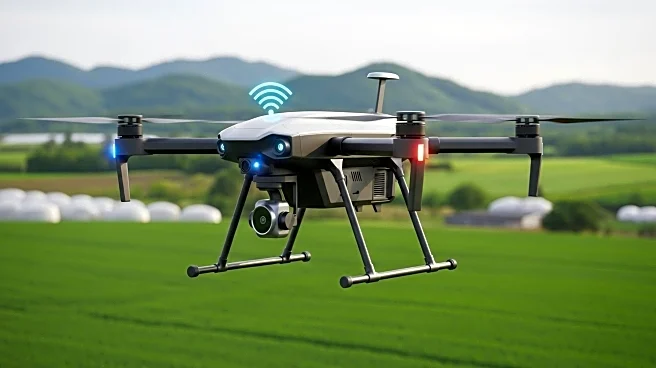What is the story about?
What's Happening?
Artificial intelligence (AI) is increasingly being integrated into agricultural practices, providing tangible benefits to farmers in their daily operations. Heather Hampton Knodle, president of Knodle Farms in Illinois, highlighted the practical applications of AI in agriculture during her presentation at the Rural Economic Outlook Conference at Oklahoma State University. She emphasized that AI is not merely a futuristic concept but is actively being utilized on farms today. AI technologies are being applied to assist row crop growers, among other agricultural sectors, in optimizing their farming processes. However, Knodle pointed out that one of the significant challenges facing the adoption of AI in agriculture is the issue of connectivity in rural areas, which can hinder the effective implementation of these technologies.
Why It's Important?
The integration of AI into agriculture represents a significant advancement in farming technology, offering potential improvements in efficiency and productivity for farmers. By automating and enhancing various farming tasks, AI can help reduce labor costs and increase crop yields, thereby contributing to the economic viability of farms. However, the connectivity issues in rural America pose a barrier to fully realizing these benefits, as reliable internet access is crucial for the operation of AI systems. Addressing these connectivity challenges is essential for ensuring that farmers can leverage AI technologies to their fullest potential, which could lead to transformative changes in agricultural practices and rural economies.
What's Next?
Efforts to improve connectivity in rural areas are likely to be a focus for stakeholders aiming to expand the use of AI in agriculture. This may involve investments in infrastructure to provide better internet access to remote farming communities. Additionally, ongoing research and development in AI technologies tailored for agricultural applications will continue to evolve, potentially offering new solutions to overcome existing barriers. Farmers, technology developers, and policymakers will need to collaborate to address these challenges and facilitate the widespread adoption of AI in agriculture.
Beyond the Headlines
The adoption of AI in agriculture also raises ethical and cultural considerations, such as the impact on traditional farming practices and the potential displacement of farm labor. As AI technologies become more prevalent, there may be a need to balance technological advancement with the preservation of rural community values and employment opportunities. Furthermore, the environmental implications of AI-driven farming practices, such as resource management and sustainability, will be important factors to consider in the long-term integration of AI in agriculture.
















